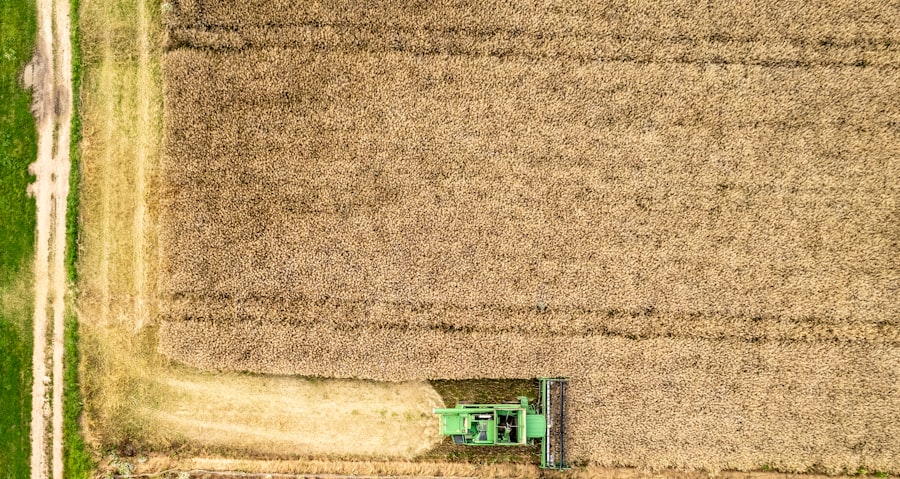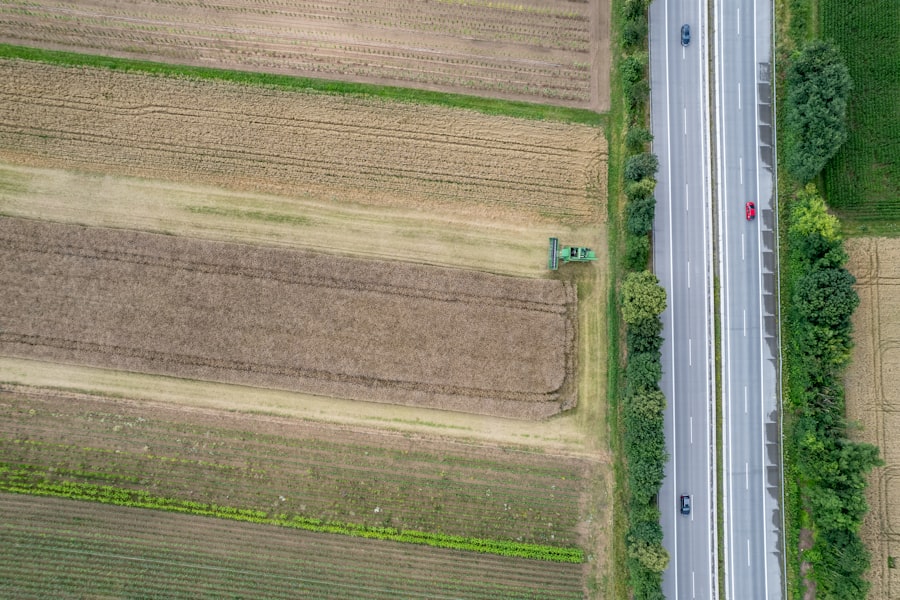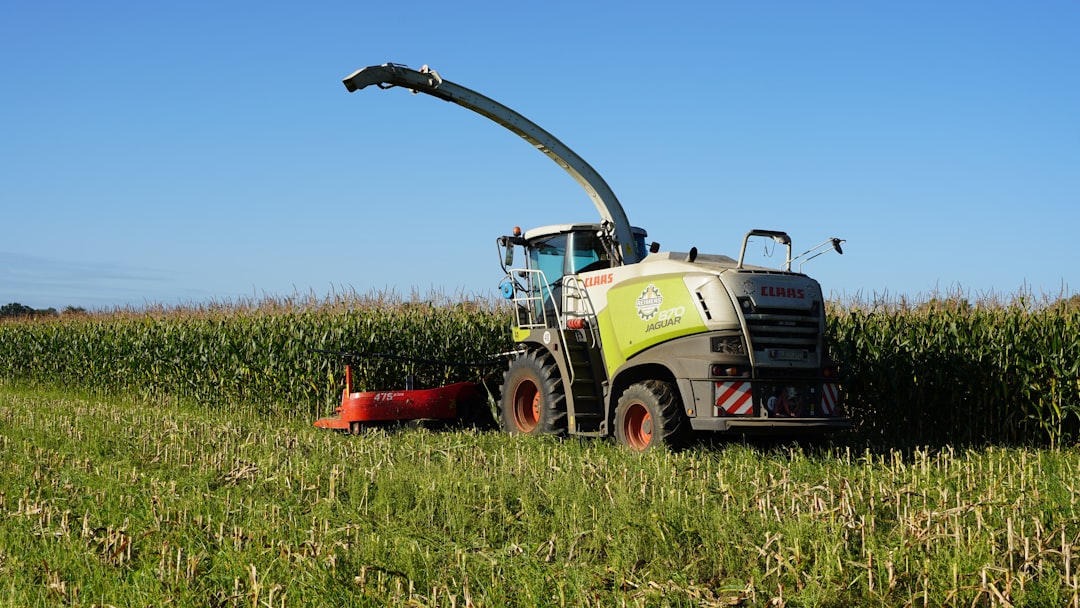Modern farming efficiency has revolutionized agricultural practices, enabling farmers to produce more food with fewer resources. However, this increased productivity often comes at a significant environmental cost. The widespread use of monoculture, where a single crop is cultivated over vast areas, has led to soil degradation and a decline in soil health.
This practice diminishes the natural nutrient content of the soil, making it reliant on chemical fertilizers that can further harm the ecosystem. Additionally, the heavy reliance on pesticides and herbicides not only affects target pests but also disrupts local wildlife and pollinator populations, which are crucial for maintaining ecological balance. Moreover, the environmental footprint of modern farming extends beyond soil health.
The intensive use of water resources for irrigation has led to the depletion of aquifers and rivers, creating water scarcity in many regions. This unsustainable extraction of water can result in long-term ecological damage, affecting not only agricultural productivity but also local communities that depend on these water sources for their livelihoods. The carbon emissions associated with industrial farming practices, including the transportation of goods and the energy-intensive nature of modern agricultural machinery, further exacerbate climate change, highlighting the urgent need for a reevaluation of farming methods.
Key Takeaways
- Modern farming efficiency has a significant environmental impact, including soil degradation, water pollution, and loss of biodiversity.
- Intensive farming practices can have negative health implications for both farm workers and consumers, including exposure to pesticides and antibiotic resistance.
- Industrialized agriculture raises ethical concerns related to animal welfare, fair labor practices, and the treatment of small-scale farmers.
- Farming efficiency can have economic consequences for small-scale farmers, leading to consolidation and loss of livelihoods in rural communities.
- Industrialized farming can lead to the loss of biodiversity and genetic diversity, threatening the resilience of agricultural systems.
The Health Implications of Intensive Farming Practices
Intensive farming practices have raised significant concerns regarding public health. The heavy use of antibiotics in livestock production is one of the most pressing issues. These antibiotics are often administered not only to treat sick animals but also to promote growth in healthy ones.
This practice contributes to the emergence of antibiotic-resistant bacteria, posing a serious threat to human health as infections become harder to treat. Furthermore, the residues of these chemicals can find their way into the food supply, raising questions about the safety of consuming products from industrial farms. In addition to antibiotic resistance, the use of chemical fertilizers and pesticides in modern agriculture has been linked to various health problems.
Studies have shown that exposure to these chemicals can lead to respiratory issues, skin irritations, and even long-term chronic conditions such as cancer. The proximity of industrial farms to residential areas can exacerbate these health risks, as communities may be exposed to harmful chemicals through air and water contamination. As awareness of these health implications grows, there is an increasing demand for transparency in food production and a shift towards more sustainable farming practices that prioritize human health.
The Ethical Considerations of Industrialized Agriculture

The ethical implications of industrialized agriculture are complex and multifaceted. One major concern is the treatment of animals within intensive farming systems. Factory farming often prioritizes efficiency over animal welfare, leading to overcrowded living conditions and inhumane treatment.
Animals are frequently kept in confined spaces with limited access to natural behaviors, raising ethical questions about the morality of such practices. As consumers become more aware of these issues, there is a growing movement advocating for more humane treatment of livestock and greater transparency in animal husbandry practices. Additionally, the ethical considerations extend beyond animal welfare to include the rights and livelihoods of farmworkers.
Many workers in industrial agriculture face poor working conditions, low wages, and limited access to healthcare. The exploitation of labor in pursuit of profit raises significant ethical concerns about social justice and equity within the agricultural system. As society grapples with these issues, there is an increasing call for reforms that prioritize ethical treatment across all aspects of food production, from animal welfare to labor rights.
The Economic Consequences of Farming Efficiency on Small-Scale Farmers
| Metrics | Value |
|---|---|
| Average farm size | 2 hectares |
| Yield per hectare | 1.5 tons |
| Income per year | 2000 |
| Expenses per year | 1500 |
| Profit margin | 25% |
The drive for efficiency in modern agriculture has had profound economic consequences for small-scale farmers. As large agribusinesses dominate the market with their ability to produce food at lower costs, many small farmers struggle to compete. This economic pressure often forces them to adopt unsustainable practices or abandon their farms altogether.
The consolidation of land and resources into fewer hands not only threatens the livelihoods of small farmers but also undermines local economies that rely on diverse agricultural practices. Furthermore, the reliance on government subsidies often favors large-scale operations over small farms, perpetuating a cycle of inequality within the agricultural sector. Small-scale farmers may find it challenging to access financial support or resources necessary for sustainable practices, leading to a reliance on conventional methods that may not be economically viable in the long term.
The Social Impact of Industrialized Farming on Rural Communities
Industrialized farming has significantly altered the social fabric of rural communities. As large agribusinesses expand their operations, many small farms are forced out of business, leading to population decline and economic instability in rural areas. This shift not only affects local economies but also erodes community ties and cultural traditions associated with farming.
The loss of small farms can result in a diminished sense of identity for communities that have historically relied on agriculture as a way of life. Moreover, the influx of industrial farming operations can lead to social tensions within rural communities. Issues such as land use conflicts, environmental degradation, and health concerns can create divisions among residents.
As some community members benefit from employment opportunities in large agribusinesses while others suffer from the negative impacts, social cohesion may be threatened. Addressing these social challenges requires a concerted effort to promote inclusive agricultural policies that support both large and small-scale farmers while fostering community resilience.
The Loss of Biodiversity and Genetic Diversity in Agriculture

The push for efficiency in modern agriculture has resulted in a significant loss of biodiversity and genetic diversity within crops and livestock. Monoculture practices have led to a reliance on a limited number of high-yield crop varieties, which diminishes genetic diversity and increases vulnerability to pests and diseases. This lack of diversity not only threatens food security but also undermines the resilience of agricultural systems in the face of climate change.
The decline in biodiversity extends beyond crops to include livestock breeds as well. Many traditional breeds are at risk of extinction due to their displacement by commercially viable breeds that prioritize productivity over adaptability. This loss of genetic diversity can have far-reaching consequences for future food systems, as diverse genetic resources are essential for breeding programs aimed at developing resilient crops and livestock capable of withstanding environmental stresses.
Preserving biodiversity within agriculture is crucial for ensuring sustainable food production and maintaining ecological balance.
The Impact of Chemical Use on Soil Health and Long-Term Productivity
The extensive use of chemicals in modern farming practices has raised serious concerns about soil health and long-term agricultural productivity. Chemical fertilizers may provide short-term boosts in crop yields; however, they can lead to soil degradation over time by disrupting microbial communities essential for nutrient cycling. Healthy soil is vital for sustainable agriculture, as it supports plant growth and contributes to overall ecosystem health.
Moreover, the accumulation of chemicals in the soil can result in contamination that affects not only crops but also groundwater sources used by local communities. The long-term reliance on chemical inputs can create a cycle of dependency that undermines soil fertility and productivity. As farmers grapple with declining soil health, there is an urgent need for practices that promote soil regeneration and sustainability, such as organic farming methods and agroecological approaches that prioritize ecological balance.
The Contribution of Modern Farming Efficiency to Climate Change
Modern farming efficiency plays a significant role in contributing to climate change through various mechanisms. The intensive use of fossil fuels in agricultural machinery, transportation, and processing generates substantial greenhouse gas emissions. Additionally, practices such as deforestation for agricultural expansion release carbon stored in trees and soil into the atmosphere, exacerbating climate change.
Furthermore, industrial agriculture’s reliance on synthetic fertilizers contributes to nitrous oxide emissions—a potent greenhouse gas—when applied excessively or improperly. The livestock sector also plays a critical role in climate change due to methane emissions from enteric fermentation in ruminants. As global demand for food continues to rise, addressing the climate impact of modern farming practices becomes increasingly urgent.
The True Cost of Subsidies and Government Support for Industrial Agriculture
Government subsidies and support for industrial agriculture have long been justified as necessary measures to ensure food security and stabilize prices. However, these subsidies often come with hidden costs that are rarely accounted for in traditional economic analyses. By favoring large agribusinesses over small-scale farmers, subsidies can perpetuate inequality within the agricultural sector while encouraging environmentally harmful practices.
Moreover, the environmental degradation resulting from subsidized industrial farming imposes additional costs on society—such as healthcare expenses related to pollution-related illnesses or loss of ecosystem services—that are not reflected in market prices. As consumers become more aware of these hidden costs, there is growing pressure on governments to reevaluate subsidy programs and redirect support towards sustainable agricultural practices that benefit both farmers and the environment.
The Role of Corporate Influence in Shaping Farming Practices
Corporate influence plays a significant role in shaping modern farming practices through various channels, including research funding, lobbying efforts, and marketing strategies. Large agribusinesses often prioritize profit over sustainability, leading to practices that may not align with ecological or social well-being. This corporate dominance can stifle innovation in sustainable agriculture by diverting resources away from research focused on environmentally friendly methods.
Additionally, corporate control over seed patents and biotechnology can limit farmers’ choices and reinforce dependency on chemical inputs. As corporations consolidate their power within the agricultural sector, there is an increasing need for policies that promote transparency and accountability while supporting diverse farming practices that prioritize sustainability over short-term profits.
The Potential Solutions for a More Sustainable and Equitable Agricultural System
Addressing the challenges posed by modern farming efficiency requires a multifaceted approach that prioritizes sustainability and equity within agriculture. One potential solution lies in promoting agroecological practices that integrate ecological principles into farming systems while enhancing biodiversity and soil health. These methods can help build resilience against climate change while supporting local economies.
Additionally, fostering cooperative models among small-scale farmers can empower communities by providing access to resources, markets, and knowledge-sharing opportunities. Supporting policies that prioritize fair trade practices and equitable distribution of subsidies can also help level the playing field between large agribusinesses and small farmers. Ultimately, creating a more sustainable agricultural system will require collaboration among stakeholders—including farmers, consumers, policymakers, and researchers—to develop innovative solutions that address environmental concerns while ensuring food security for future generations.
By prioritizing sustainability over efficiency alone, society can work towards an agricultural system that benefits both people and the planet.
In recent years, the conversation around the true cost of modern farming efficiency has gained significant attention. As farmers strive to maximize output and minimize costs, the environmental and social impacts of these practices are often overlooked. A related article that delves into these issues can be found on MyGeoQuest, which explores the balance between agricultural productivity and sustainability. This article provides valuable insights into how modern farming techniques can be optimized to benefit both the economy and the environment. For more information, you can read the full article by visiting this link.
WATCH NOW! Why America’s Heartland Is Disappearing Fast
FAQs
What is modern farming efficiency?
Modern farming efficiency refers to the use of advanced technology, machinery, and techniques to increase productivity and reduce costs in agricultural production. This includes the use of precision agriculture, genetically modified organisms (GMOs), and automation.
What are the benefits of modern farming efficiency?
Modern farming efficiency can lead to increased crop yields, reduced labor costs, improved resource management, and lower environmental impact. It also allows farmers to produce more food with less land, water, and inputs.
What are the true costs of modern farming efficiency?
The true costs of modern farming efficiency include environmental degradation, loss of biodiversity, soil erosion, water pollution, and negative impacts on human health. Additionally, the reliance on monocultures and GMOs can lead to decreased resilience in the face of climate change and pest outbreaks.
How does modern farming efficiency impact the environment?
Modern farming efficiency can lead to increased use of chemical fertilizers, pesticides, and herbicides, which can pollute waterways and harm non-target organisms. It can also contribute to deforestation, habitat destruction, and greenhouse gas emissions.
What are some alternatives to modern farming efficiency?
Some alternatives to modern farming efficiency include organic farming, agroecology, and regenerative agriculture. These approaches prioritize soil health, biodiversity, and ecological balance, and aim to minimize the use of synthetic inputs.
